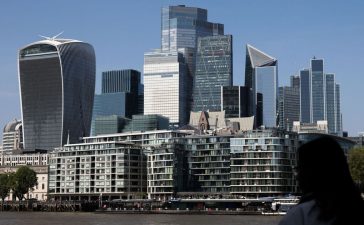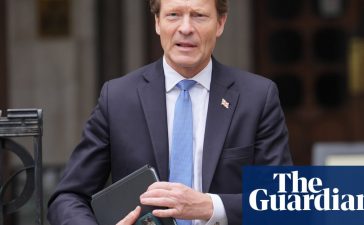BoE’s Mann: Another interest rate rise more likely than a cut
The Bank of England is more likely to raise interest rates again than to start cutting them, says BoE policymaker Catherine Mann.
Mann, one of the more hawkish members of the Bank’s monetary policy committee, fears that there are “material upside risks” to the Bank’s inflation outlook.
Speaking at the Lámfalussy Lectures Conference in Budapest, Hungary, this morning, Mann cautions that the stabilization of headline UK inflation is not yet “the harbinger of a turning point towards a sustainable return to the 2% target”, given the sharp increase in food prices and services inflation.
Man says that the Bank should ‘stay the course’, after it raised interest rates to 4% last week.
It would be more of a mistake to stop tightening too soon, than too late, she argues, saying:
I am looking for a significant and sustained deceleration in higher frequency price increases and in the underlying inflation measures and expectations towards inflation rates that are consistent with achieving the 2% target.
Uncertainty around turning points should not motivate a wait-and-see approach, as the consequences of under tightening far outweigh, in my opinion, the alternative. We need to stay the course, and in my view the next step in Bank Rate is still more likely to be another hike than a cut or hold.
Key events
Filters BETA
Sharp fall in house building sends UK construction output to near three-year low
Britain’s construction sector has suffered its worst month in almost three years, as housebuilding was hit by rising borrowing costs.
UK construction companies reported another downturn in business activity during January, the latest survey of purchasing managers from S&P Global and CIPS shows.
Building firms blamed weaker client demand, and a slowdown in new projects in recent months due to rising borrowing costs.
House building was the weakest-performing category of construction output in January, shrinking at the fastest rate since May 2020. Lower volumes of residential work were attributed to rising borrowing costs, unfavourable market conditions and greater caution among clients, S&P Global says.

The surge in mortgage rates in recent months has weighed on the housing market, knocking demand for mortgages to the lowest level since the depths of the 2020 lockdown.
Commercial activity decreased for the first time in five months during January, reflecting softer demand and delayed-decision making on new projects. But civil engineering activity inched up, close to levels showing activity stabilised.
Overall, the Construction Purchasing Managers’ Index (PMI) dropped to 48.4 from 48.8 in December, hitting its lowest level since May 2020. Any reading below 50 shows a contraction.
But, there are some positive signals – with business expectations rebounding from the low point seen last December.
Tim Moore, economics director at S&P Global Market Intelligence, explains:
For some firms, the recovery in business optimism to its highest for six months was driven by signs of a turnaround in new sales enquires at the start of 2023.
Other construction companies simply noted gradual improvements in the general economic outlook and hoped that confidence would return at a later stage this year to alleviate the current lack of momentum in the house building sector.”
National Grid puts two coal-fired power stations on standby

Alex Lawson

National Grid has asked two coal-fired power plants to warm up in case electricity supplies are tight tomorrow.
The Grid’s electricity system operator (ESO) asked Uniper’s Ratcliffe-on-Soar unit on Sunday to prepare for use on Tuesday. This morning, the ESO issued a further notice, requiring EDF’s West Burton A plant, also in Nottinghamshire, to warm up for use on Tuesday.
They are two of the five coal-fired units that National Grid has paid to put on standby as part of winter contingency plans.
Wind speeds have dropped this week, cutting the amount of wind power generated for use in Great Britain.
ESO figures this morning show that wind accounts for 18% of power generation, down from as high as 52% on some days last week.
The ESO said asking the plants to warm was “prudent” and added “this does not mean electricity supplies are at risk”.
The coal plants have been warmed several times this winter but have been stood down each time. The cost of keeping them on standby has been estimated at between £220m and £420m.
New UK car market grew 14.7% in January
It’s official, the UK’s new car market grew for the sixth month running in January.
Car registrations rose by 14.7% last month, with 131,994 new cars hitting the road, according to industry body the SMMT.
This was the best start to the year since January 2020, when 149,279 units were registered.
Sales of battery-powered electric cars jumped by 19.8% to 17,294, while petrol car sales were 14.6% higher at 58,973. Motorists continued to shun diesel, though – knocking sales by 12.1% to 5,280.
The SMMT predicts the car market will grow by 11.1% this year, to reach 1.79m units, “despite straitened economy and strained supply chains”.
The SMMT is concerned, though, that the rollout of electric chargepoints is not keeping pace with growt in sales of plug-in vehicles.
Mike Hawes, SMMT chief executive, says:
The automotive industry is already delivering growth that bucks the national trend and is poised, with the right framework, to accelerate the decarbonisation of the UK economy. The industry and market are in transition, but fragile due to a challenging economic outlook, rising living costs and consumer anxiety over new technology.
We look to a Budget that will reaffirm the commitment to net zero and provide measures that drive green growth for the sector and the nation.
Catherine Mann, incidentally, was one of the seven BoE policymakers who voted for last Thursday’s half-point increase in interest rates, to 4%.
Only two policymakers,Swati Dhingra and Silvana Tenryro, opposed the move, voting to keep Bank rate at 3.5%.
The financial markets are pricing in one more increase, to 4.25%, this spring, before rates drop back to 4% by the end of this year.
BoE’s Mann: Another interest rate rise more likely than a cut
The Bank of England is more likely to raise interest rates again than to start cutting them, says BoE policymaker Catherine Mann.
Mann, one of the more hawkish members of the Bank’s monetary policy committee, fears that there are “material upside risks” to the Bank’s inflation outlook.
Speaking at the Lámfalussy Lectures Conference in Budapest, Hungary, this morning, Mann cautions that the stabilization of headline UK inflation is not yet “the harbinger of a turning point towards a sustainable return to the 2% target”, given the sharp increase in food prices and services inflation.
Man says that the Bank should ‘stay the course’, after it raised interest rates to 4% last week.
It would be more of a mistake to stop tightening too soon, than too late, she argues, saying:
I am looking for a significant and sustained deceleration in higher frequency price increases and in the underlying inflation measures and expectations towards inflation rates that are consistent with achieving the 2% target.
Uncertainty around turning points should not motivate a wait-and-see approach, as the consequences of under tightening far outweigh, in my opinion, the alternative. We need to stay the course, and in my view the next step in Bank Rate is still more likely to be another hike than a cut or hold.

In the London metal market, copper prices have hit their lowest in nearly four weeks this morning.
The three-month copper on the London Metal Exchange fell 0.5% to $8,935.50 a tonne by 0757 GMT. Earlier in the session, it hit $8,904.50, its lowest since January 10th, Reuters reports.
The stronger dollar is weighing on commodity prices, as traders calculate that the strong US job creation in January will lead to more interest rate rises.
Doubts about China’s economic recovery could also hit the copper price, after commodity prices were lifted by Beijing’s relaxation of Covid restrictions.
ANZ analysts told clients in a note:
“We believe the sector’s performance is running ahead of fundamentals as demand is yet to improve materially. Any macro disappointment could lead to a short-term price correction before seeing a sustained rise in prices,”
“China’s reopening and improving economic backdrop is supportive for the sector.”
US-China tensions and rate hike jitters hit markets
‘’It’s glass half empty time on financial markets”, says Susannah Streeter, senior investment and markets analyst at Hargreaves Lansdown, as unease spreads about a deteriorating geo-political backdrop.
Streeter explains:
The shooting down of a suspected Chinese spy balloon off the coast of South Carolina has dashed hopes that reproachment between Washington and China could be achieved, causing a slide on the Hang Seng in Hong Kong and the Shanghai Composite.
There is a chance this could be a short-lived wobble, given that the US State Department appears to have kept the diplomatic doors open, suggesting a planned visit to China by US State Secretary Anthony Blinken could happen as soon as conditions allow.
Investors are also recognising that more interest rate hikes are set to be inflicted on economies, after the US added over half a million new jobs in January, she adds:
There is worry resurfacing about what Friday’s super-strong US jobs figure signifies about just how tight the Federal Reserve will turn its monetary screws to continue to squeeze inflation and whether that could still hurtle the economy towards a harder landing, despite its robust showing so far.
FTSE 100 falls back from record high
In the City, the blue-chip share index has dropped back from its highest ever level.
The FTSE 100 index has fallen by 45 points, or 0.6%, to 7855 points at the start of trading.
On Friday it climbed over its previous record high, set in May 2018, as the index – dominated by multinational companies – was lifted by hopes that world central banks will slow the pace of interest rate rises as inflation pressures cool.
European markets are also in the red in early trading, with Germany’s DAX down 0.7% and France’s CAC losing 0.9% at the open.
Victoria Scholar, head of investment at interactive investor, tells us:
“The FTSE 100 closed at a record high on Friday driven by expectations of a dovish tilt from the Bank of England ahead, a weaker pound after a very strong US jobs report and its favourable sectoral mix which benefited the index over the last year.
The UK index has few tech heavyweights allowed it to avoid last year’s ‘tech wreck’ and a high amount of oil and mining giants which benefited from last year’s commodity boom. Plus banks like Standard Chartered have logged strong share price performances over the last year on the back of the rising rate environment.
However this morning, the FTSE 100 is giving back some of its gains after the US downed an alleged Chinese spying balloon, putting a strain on US-China relations and raising concerns about geopolitical instability. Plus, a strong US jobs report on Friday has indicated that the Federal Reserve may have more work to do on interest rates, pressurising global equity markets.
Safe-haven assets such as precious metals like gold and silver are staging gains as investors look for a place to hide from the uncertainty.
Australian startup Recharge wins bid for collapsed Britishvolt
An Australian company has been chosen as the preferred bidder to take over Britishvolt, the failed UK startup which hoped to build a major factory to make batteries for electric vehicles.
Recharge Industries was selected by auditors, EY, to buy the failed company which planned to build a battery factory in the North East. The deal is expected to finalise within the next week.
Recharge is an emerging Australian company yet to construct a major project, but will now be responsible for delivering on UK hopes to electrify its automotive industry after outbidding rivals to take over collapsed battery maker Britishvolt.
In a whirlwind fortnight, Recharge Industries put together an aggressive package that also revives plans to build a £3.8bn “gigafactory” in the north of England to supply the next generation of UK-built electric vehicles, free from Chinese materials.
The Australian company, which sits under New York-based investment firm Scale Facilitation, beat three other offers to become the preferred bidder to take Britishvolt out of the hands of administrator EY.
Here’s the full story:
Beijing has stepped up its condemnation of Washington’s decision to shoot down the Chinese balloon spotted in US airspace last week.
China accused the US of dealing a “serious blow” to relations, undermining the efforts to warm ties between the two nations since presidents Biden and Xi met in Bali last November.
Vice-minister of foreign affairs Xie Feng lodged a formal protest with the US embassy in Beijing, accusing the US of “seriously” violating the spirit of international law and international conventions.
Xie added:
What the US has done has dealt a serious blow and damaged the efforts and advances in stabilising China-US relations since the Bali meeting.
Update on balloon: Beijing has filed solemn representation with the US embassy in China.
China released a statement dated Sunday. Vice Foreign Minister Xie Feng says US has overreacted and actions have hurt the improvement in relations made since the G20 Bali meeting. pic.twitter.com/KBSqeySrTT
— David Ingles (@DavidInglesTV) February 6, 2023
The drop in Chinese stocks today reflects concerns that the shooting down of the suspected spy balloon could lead to economic retaliation by the Biden administration.
Investors should pay attention to the diplomatic tensions over the Chinese balloon entering US air space, Deutsche Bank analyst Jim Reid told clients, adding:
The US shot it down over a weekend that was supposed to mark a thawing of diplomatic relations between the countries, with Secretary of State Antony Blinken visiting China, the first such visit in four years.
This was postponed last week and an originally conciliatory China turned more aggressive after the balloon was eventually shot down. We will see if there is any retaliation and/or how strong the rhetoric is.
Introduction: UK car sales jumped in January
Good morning, and welcome to our rolling coverage of business, the financial markets and the world economy.
UK car sales jumped in January, despite the fears of a recession and the squeeze on household incomes from high inflation.
New car registrations in the United Kingdom rose by around 14% year-on-year in January, preliminary industry data this morning shows.
The Society of Motor Manufacturers and Traders (SMMT) said it expects registrations to rise 11% to 1.79 million units in 2023, despite strained supply chains and inflationary pressures in the UK.
The SMMT will provide the final figures for the month at 9am.
The UK automobile industry needs a boost, after car production fell to its lowest level since 1956 last year. Companies continued to struggle to obtain parts due to supply chain problems caused by Covid, meaning manufacturers struggled to meet demand.
Also coming up today
Financial markets are a little edgy today, as tensions between Washington and Beijing rise.
China’s CSI 300 index has dropped by 1.3%, and Hong Kong’s Hang Seng is down 2%, as traders react to the cancellation of US secretary of state Antony Blinken’s weekend visit to China and the shooting down of a Chinese balloon.
European markets are expected to open lower, while the UK’s FTSE 100 could drop back from Friday’s record closing high.
Last Friday’s surprisingly strong US employment report is also weighing on markets, explains Naeem Aslam, chief market analyst at Avatrade.
Firstly, it is Friday’s US Job report which has made traders to think that the Fed may continue with its interest rate and perhaps could adopt a hawkish stance as the labour market is more than robust.
Secondly, geopolitical tensions have flared up between the two biggest economies of the world, and the concern is that this could have an adverse impact on the economic relationship between the US and China.
We’ll hear from two Bank of England policymakers today, with monetary policy committee member Catherine Mann giving a speech this morning and chief economist Huw Pill holding a question and answer session this afternoon. This may give fresh insight into whethet the BOE is close to ending its interest rate hikes, after lifting rates to 4% last week.
Last Friday, Pill said the Bank must be careful not to raise borrowing costs too high:
The agenda
-
8.30am GMT: Eurozone construction PMI for January
-
8.40am GMT: Bank of England policymaker Catherine Mann speaks at the Lamfalussy Lectures Conference ‘New dimensions of central banking in the post-Covid era’
-
9am GMT: UK car sales figures for January
-
9.30am GMT: UK construction PMI for January
-
10am GMT: Eurozone retail sales for December
-
5pm GMT: BoE chief economist Huw Pill holds Q&A







